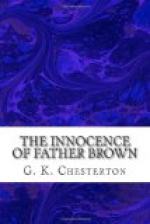“That fellow seems to know more than he ought to,” whispered the doctor peevishly to Wilfred. “Those popish priests are deucedly sly.”
“No, no,” said Bohun, with a sort of wild fatigue. “It was the lunatic. It was the lunatic.”
The group of the two clerics and the doctor had fallen away from the more official group containing the inspector and the man he had arrested. Now, however, that their own party had broken up, they heard voices from the others. The priest looked up quietly and then looked down again as he heard the blacksmith say in a loud voice:
“I hope I’ve convinced you, Mr. Inspector. I’m a strong man, as you say, but I couldn’t have flung my hammer bang here from Greenford. My hammer hasn’t got wings that it should come flying half a mile over hedges and fields.”
The inspector laughed amicably and said: “No, I think you can be considered out of it, though it’s one of the rummiest coincidences I ever saw. I can only ask you to give us all the assistance you can in finding a man as big and strong as yourself. By George! you might be useful, if only to hold him! I suppose you yourself have no guess at the man?”
“I may have a guess,” said the pale smith, “but it is not at a man.” Then, seeing the scared eyes turn towards his wife on the bench, he put his huge hand on her shoulder and said: “Nor a woman either.”
“What do you mean?” asked the inspector jocularly. “You don’t think cows use hammers, do you?”
“I think no thing of flesh held that hammer,” said the blacksmith in a stifled voice; “mortally speaking, I think the man died alone.”
Wilfred made a sudden forward movement and peered at him with burning eyes.
“Do you mean to say, Barnes,” came the sharp voice of the cobbler, “that the hammer jumped up of itself and knocked the man down?”
“Oh, you gentlemen may stare and snigger,” cried Simeon; “you clergymen who tell us on Sunday in what a stillness the Lord smote Sennacherib. I believe that One who walks invisible in every house defended the honour of mine, and laid the defiler dead before the door of it. I believe the force in that blow was just the force there is in earthquakes, and no force less.”
Wilfred said, with a voice utterly undescribable: “I told Norman myself to beware of the thunderbolt.”
“That agent is outside my jurisdiction,” said the inspector with a slight smile.
“You are not outside His,” answered the smith; “see you to it,” and, turning his broad back, he went into the house.
The shaken Wilfred was led away by Father Brown, who had an easy and friendly way with him. “Let us get out of this horrid place, Mr. Bohun,” he said. “May I look inside your church? I hear it’s one of the oldest in England. We take some interest, you know,” he added with a comical grimace, “in old English churches.”
Wilfred Bohun did not smile, for humour was never his strong point. But he nodded rather eagerly, being only too ready to explain the Gothic splendours to someone more likely to be sympathetic than the Presbyterian blacksmith or the atheist cobbler.




